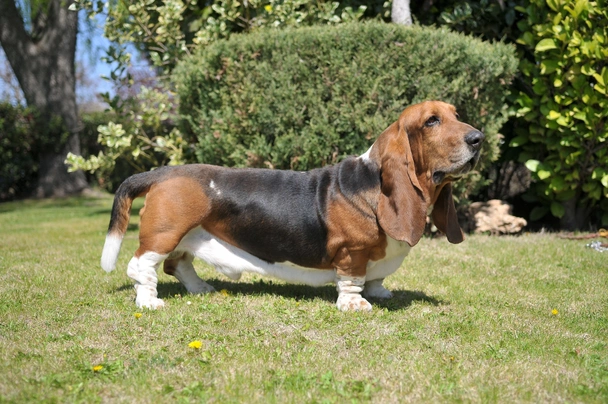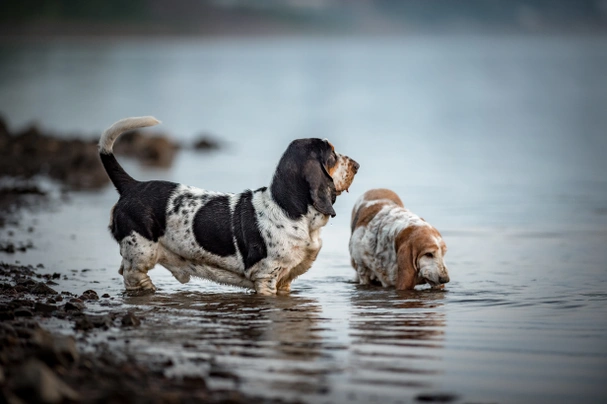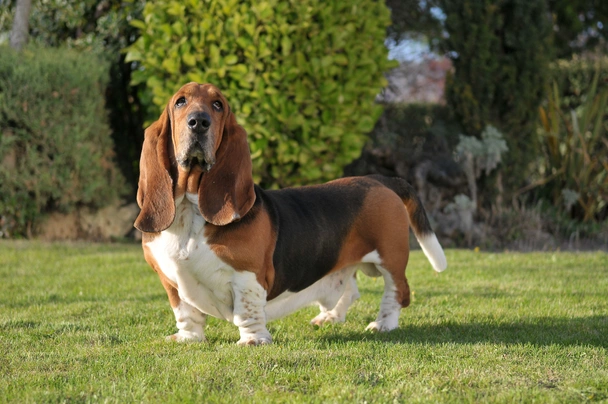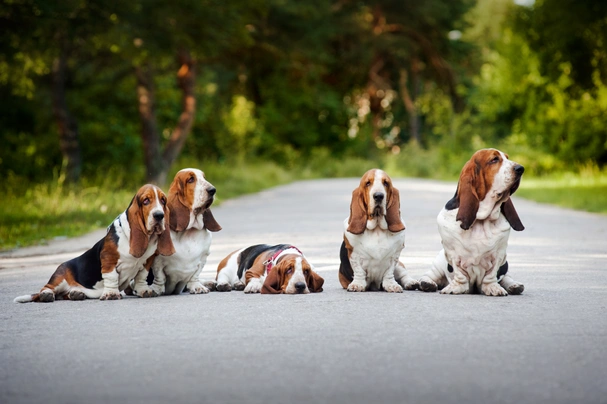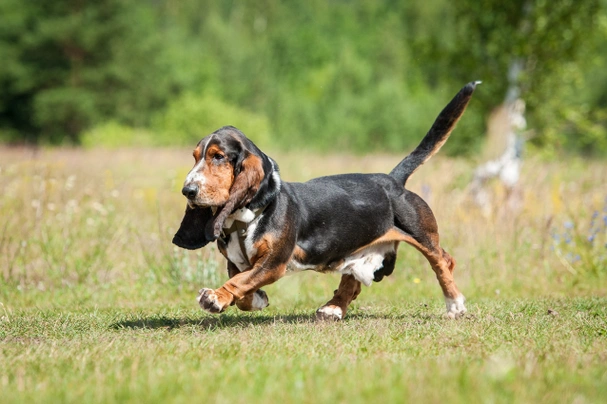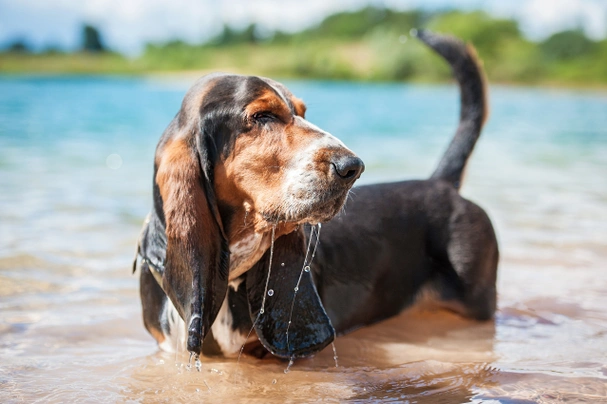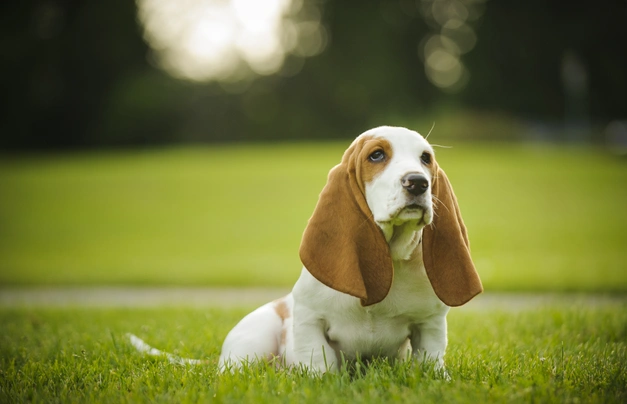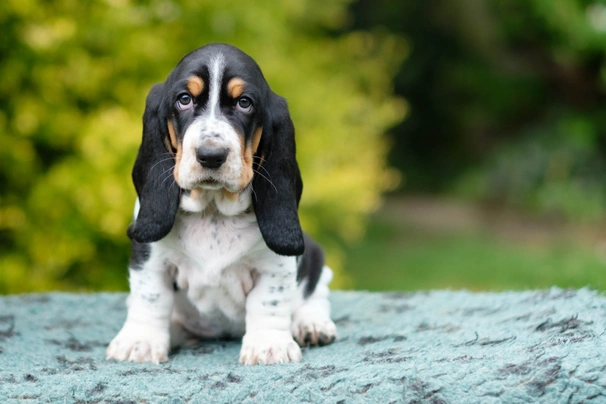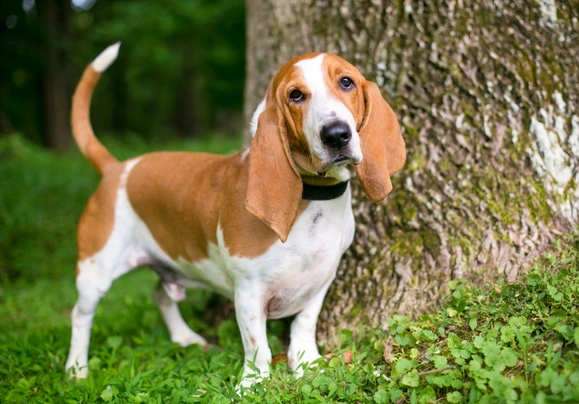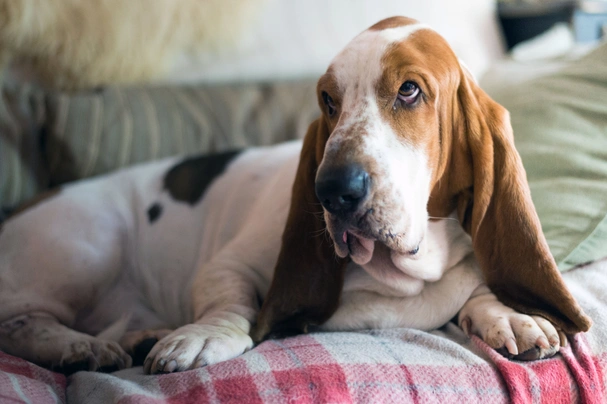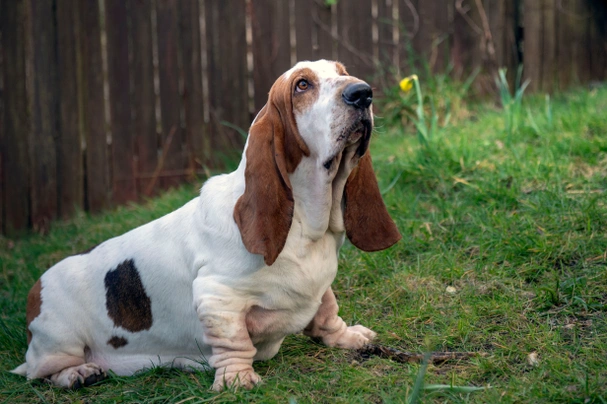Basset Hound
Pros
Cons
Introduction of the Basset Hound
The Basset Hound has earned a place in the hearts and homes of many people both here in the UK and elsewhere in the world all thanks to their extraordinary looks and sweet kind natures. Just at home by a fireside as they are outside on the moors the Basset can chase down prey albeit at their own persistent pace over vast distances with relative ease.
The breed has been around for centuries with some people believing these dogs were around in the Middle Ages. In more recent times the Basset Hound has been depicted by cartoonists their image has been used to advertise shoes which all helped bring the Basset Hound into the limelight not only here in the UK but all over the world. Today they are still one of the most popular pets around thanks to their unique looks and calm relaxed loving natures which makes them such a great family pet.
History of the Basset Hound
It is thought the Basset Hound was first bred by French monks during the Middle Ages. The breed is in fact closely related to other hounds namely the French Bassets but over the years the breed became unique to Britain. Early records show them being black and tan in colour and boasting heavy large heads with long ears and bodies as well as short heavy legs. These dogs were reputed to be highly skilled scenting dogs that boasted a throaty almost melodious bark.
There is some evidence of these hounds having been imported to Britain in the 15th Century by King James IV of Scotland. He used the dogs to drive game out onto open ground for huntsmen. Basset-like dogs even get a mention in Shakespeare's Midsummer Nights’ Dream. With this said the dogs we know today can only be traced back to the 19th Century when a dog was brought back to the UK by Sir Everett Millias. It was during this time that people started keeping breed records all thanks to enthusiasts of the Basset Hound back in the day.
The first time the word "basset" was used to refer to dogs was in 1585 when Jacques de Fouilloux Venerie described hounds that were used to track badgers. He also described how dogs with crooked legs and smooth coats worked better through the undergrowth and that dogs with straighter legs and rougher coats worked better over open ground which are thought to be the early Griffon Bassets.
By the mid-1780's a French noble called the Marquis de Lafayette offered 7 large hounds to George Washington who was another fan of these dogs and someone who was keen to improve the breed. The hounds he received were fierce examples of the breed that could not be fed together for fear of them injuring each other. During the French Revolution the hounds suffered because their masters the ruling classes were put to death and as such many strains of the hounds vanished altogether which included the strong and loyal St Hubert line.
As time passed the numbers of hounds dropped even further until just two types remained namely the Basset Artesien Normand and the Basset Griffon Vendeen. The very first "Bassets" was introduced to Britain in 1866 having been imported by the Count le Coulteux de Cantleu and were named Basset and Belle. The hounds were given to Lord Galway who described them as being large low hounds that resembled the Dachshund. These hounds had the same colour coats as that of the Foxhound. He along with another hound enthusiast Lord Onslow continued to develop the breed which was finally recognised by the Kennel Club in 1880.
In 1884 The Basset Hound Club was officially formed with their goal being to encourage more breeding of these extraordinary dogs for both hunting and showing purposes. Bassets were very popular with the Royals with HRH Princess Alexandra being one of the eminent members of the club. However the club was affected by WWI and closed its doors in 1921 but thanks to a few breed enthusiasts the Basset Hound did not vanish altogether. Luckily thanks to the great efforts of Miss Peggy Keevil during WWII the breed survived and was to become a firm favourite both in the show ring in the field and the home environment.
A breed standard was established during the 19th Century and was only updated in 2010. Today Basset Hounds are among some of the most recognised dogs on the planet and have become a popular choice of pets and companions all thanks to their extraordinary looks and kind personalities.
Interesting facts about the breed
- Is the Basset Hound a vulnerable breed? No they are among the most popular dogs in the UK thanks to their unique looks and kind loyal personalities
- The Basset Hound almost vanished altogether because of the French Revolution but thankfully two strains survived
- A Basset Hound’s ears serve a purpose because the fact they are so long helps bring scents and smells right to a dog’s nose when they are tracking their prey
- Their name “Basset” comes from the French word “Bas” which when translated means “low”
- They were the preferred hunting dogs of French nobles and the aristocracy
Appearance of the Basset Hound
Height at the withers: Males 30–38 cm Females 28–36 cm
Average Weight: Males 25–34 kg Females 20–29 kg
Basset Hounds are quite extraordinary looking dogs that are well described as being "large hounds on short legs". However they are working dogs and as such they are powerful looking and well balanced which in short means they possess a tremendous amount of stamina when out working in the field. Apart from their strong short back legs a Basset Hound's large and proud head is another of their striking and ultra recognisable physical traits.
A Basset's head is dome shaped with a very prominent occiput. They boast quite a wide brow and some dogs have wrinkles around their eyes and brow which is acceptable as a breed standard. Their noses are black although some lighter coloured hounds do boast liver or brown coloured noses. A Basset's eyes are a lovely lozenge shape being dark in colour but in lighter coated dogs their eyes can be lighter which is permissible. Basset Hounds have a very calm look about their eyes which often gives the impression of them being "serious" characters.
Their ears are long and set low on their heads. They are very velvety to the touch and curl inwards adding to a Basset Hounds overall appeal. They have strong looking jaws and a perfect bite and their necks are well muscled with dogs holding them slightly arched. A Basset's forequarters are powerful and they boast strong well-laid back shoulders. Their legs are short and extremely well muscled with dogs boasting a tremendous amount of bone in their legs too. Dogs sometimes have wrinkles on their front legs which is perfectly acceptable as a breed standard.
A Basset Hound's body is long with a very prominent breast bone and they are low to the ground with just enough clearance for these dogs to travel easily without rubbing their bellies on the ground no matter what type of terrain they are asked to work on. Dogs have well sprung ribs that extend well down their bodies. Their backs are broad and level with their loins slightly arched. Their hindquarters are extremely powerful and well-muscled and dogs often have wrinkles on their back legs which are acceptable as a breed standard.
A Basset Hound's feet are well padded and quite large which allows them to be very sure footed even on rougher terrain. Their tails are long and well set tapering to the tip with a small amount of coarser hair on the underside of it. Dogs carry their tails high and slightly curved which adds to their proud look.
When it comes to their coat this is short and smooth with no feathering at all and their coats should never be too fine to the touch. Their skin is very supple without being too loose either. The accepted breed colours for Kennel Club registration are as follows:
- Lemon & White
- Red & White
- Tan & White
- Tricolour
Gait/movement
One of the most important things about a Basset Hounds conformation is that it allows hounds to work and move as they are supposed to. When a Basset Hound moves they do so with a tremendous amount of purpose with an effortless action with their front legs reaching forward and a tremendous amount of power from their hindquarters. A hound’s stifles and hocks must be free-moving with dogs not dragging their toes.
Faults
The Kennel Club frowns on any exaggeration or departure from the breed standard and would judge faults on how much they affect a dog' overall health and wellbeing as well as their ability to perform.
Male dogs should have both testicles fully descended into their scrotums and it is worth noting that dogs can be a little shorter or taller as well as slightly lighter or heavier than stated in the Kennel Club breed standard which is given as a guideline only.
Temperament of the Basset Hound
Basset Hounds are tenacious characters by nature which is a trait they need in the field when working. They boast an ancient lineage and their hunting instincts remain keen and strong even in a home environment. However they are very calm placid dogs by nature and they rarely show any aggression but rather a loving and affectionate side to their character which in short means they are a pleasure to have around.
They are however known to be stubborn at times which is especially true when they have their noses to the ground following a scent they've picked up. As previously mentioned their hunting instinct remains strong which can result in a dog choosing to ignore a command. As such they are not the best choice for first time owners because Basset Hounds need to be well trained and socialised from a young age and then gently yet firmly handled so they understand who is the alpha dog in a household.
They are extremely loyal dogs and they generally enjoy being around people and other animals. It's important to remember that Basset Hounds are pack animals which means if they are not handled and trained correctly they will start displaying a more dominant side to their character which is another reason why they are not the best choice for first time owners.
Basset Hounds are not known to be destructive providing they have been given enough daily exercise and stimulation. They are quite unique by nature but one thing they are not is lazy even though they may give the impression of being so. Another thing about a Basset is their melodious voice and their tendency to bark when they want attention which although charming can become a nuisance at times.
Are they a good choice for first time owners?
Basset Hounds are a good choice for first time dog owners providing they have the time and patience to dedicate to training their canine companion correctly bearing in mind that it can prove challenging thanks to their stubborn natures. It takes time and patience to train a Basset Hound puppy but the rewards are tremendous although a mature dog will always turn a deaf ear to a command when it suits them.
What about adaptability?
Basset Hounds are adaptable and providing they are given enough daily physical exercise combined with as much mental stimulation to prevent boredom from setting in they are just as happy living in an apartment as they are living in a house in the country. However like all dogs Bassets like to be able to roam around a secure back garden whenever they can so they can really express themselves as they should.
What about separation anxiety?
Basset Hounds form strong ties with their families and dogs are never very happy when they find themselves left on their own for longer periods of time. They are better suited to people who either work from home or in households where one person stays at home when everyone else is out so they are never alone for any length of time which could see a dog suffering from separation anxiety. This can lead to them being destructive around the home and howling incessantly which is a dog's way of relieving any stress they are feeling and their way of keeping themselves entertained.
What about excessive barking?
Basset Hounds are not known to be "barkers" but they will howl if they are unhappy about anything which is usually when they are left on their own for longer periods of time. Even dogs that are not known to be “barkers” will let their feelings be known when they are unhappy about things.
Do Basset Hounds like water?
Basset Hounds are not designed to be good "swimmers" thanks to their long bodies and short legs. With this said some love water and providing they are wearing safety vests they can be allowed in although care should always be taken and dogs should never be left unsupervised around water. With this said they love paddling in shallow water and will happily splash around in it whenever they can. As such care should always be taken when walking a Basset Hound off the lead anywhere near more dangerous watercourses just in case a dog falls in and needs rescuing.
Are Basset Hounds good watchdogs?
Basset Hounds are not natural watchdogs although this is not to say a dog would not be quick off the mark to let an owner know when there are strangers about although they would rarely do this aggressively. They are just too friendly to be very good guard dogs.
Intelligence / Trainability of the Basset Hound
It would be fair to say that Basset Hounds boast having a mind of their own when it comes to training. They are intelligent but this independent thinking side of their nature can make it hard to train a Basset Hound. With this said their socialisation and training must start as early as possible paying particular attention to the "recall" command. The reason being that the hound in these dogs will see them wandering off if they get the whiff of something they find more interesting. The key to successfully training a Basset Hound is to be consistent and to show patience because rushing their training will not bring good results.
Basset Hound puppies are incredibly cute and therefore it is all too easy to spoil them during the early months of their lives which can prove costly when dogs mature. Owners need to start out as they mean to go on which means educating a puppy right from the word go by setting limits and boundaries for them. All dogs including Basset Hounds like to know what their owners expect of them and without boundaries dogs grow up to be unruly which can make them harder to live with and handle. The first commands a Basset Hound puppy should be taught are as follows:
- Come
- Sit
- Stay
- Quiet
- Leave it
- Down
- Bed
Children and other
Basset Hounds are renowned for being very tolerant when around children which makes them a great choice as a family pet. However because of their large size a Basset Hound might accidentally knock a toddler over which could result in frightening the child. As such any interaction between children and a Basset Hound should be supervised by an adult to make sure things don’t get too boisterous.
When it comes to other pets if a Basset Hound has been well socialised and introduced to an animal from a young age they generally get on very well with them. However when introducing a new pet or animal to a dog it's always best to do this slowly and carefully to make sure things go smoothly.
Health of the Basset Hound
The average life expectancy of a Basset Hound is between 11 to 12 years when properly cared for and fed an appropriate good quality diet to suit their ages.
However like many other pedigree dogs they are known to suffer from quite specific health issues some of which are hereditary whereas other conditions are acquired. The health problems more commonly associated with Basset Hounds include the following:
- Entropion(Eyelids Folding Inwards )
- Ectropion( Eyelids Roll Outwards )
- Primary glaucoma (Poag) – testing available
- Invertebral disc disease
- Elbow Dysplasia - test available
- Malassezia Pachydermatitis - a skin condition
- Bloat/gastric torsion
Another condition that affects the breed is Osteochondrodysplasia which is a type of Dwarfism. It is also worth noting that Basset Hound puppies should not be allowed to jump in and out of cars or run up and down stairs as this would put too much pressure on their joints and bones which could lead to problems later in their lives.
More about Malassezia Pachydermatitis
Malassezia pachydermatitis is a nasty skin condition that is commonly diagnosed in the Basset Hound. It is cause by a yeast organism that lives in the skin of all dogs whether healthy or not. When a dog has healthy skin the organism is not a problem but if the organisms multiply too quickly it causes inflammation and irritation. Because the organism is naturally occurring in a dog's skin when a problem flares up it cannot be eliminated but it can be managed and controlled with the right medication and treatment. The problem is often finding the right treatment for a dog's condition which can often prove challenging.
What about vaccinations?
Basset Hound puppies would have been given their initial vaccinations before being sold but it is up to their new owners to make sure they have their follow-up shots in a timely manner with the vaccination schedule for puppies being as follows:
- 10 -12 weeks old bearing in mind that a puppy would not have full protection straight away but would be fully protected 2 weeks after they have had their second vaccination
There has been a lot of discussion about the need for dogs to have boosters. As such it's best to talk to a vet before making a final decision on whether a dog should continue to have annual vaccinations which are known as boosters.
What about spaying and neutering?
A lot of vets these days recommend waiting until dogs are slightly older before spaying and neutering them which means they are more mature before undergoing the procedures. As such they advise neutering males and spaying females when they are between the ages of 6 to 9 months old. Other vets recommend spaying and neutering dogs when they are 6 months old but never any earlier unless it is for medical reasons.
What about obesity problems?
Some Basset Hounds gain weight after they have been spayed or neutered and it's important to keep an eye on a dog's waistline just in case they do. If a dog starts to put on weight it's important to adjust their daily calorie intake and to up the amount of exercise they are given. Older Bassets too are more prone to gaining weight and again it's essential they be fed and exercised accordingly because obesity can shorten a dog's life by several years. The reason being that it puts a lot of extra strain on a dog's internal organs including the heart which must work that much harder to pump blood through a dog's system.
What about allergies?
Basset Hounds are prone to suffering from allergies and more especially from a condition known as Malassezia Pachydermatitis so it is important for a dog to see a vet sooner rather than later if one flares up. Allergies can be notoriously hard to clear up and finding the triggers can be challenging. With this said a vet would be able to make a dog with an allergy more comfortable while they try to find out the triggers which could include the following:
- Certain foods
- Airborne pollens
- Dust mites
- Environment
- Flea and tick bites
- Chemicals found in everyday household cleaning products
Participating in health schemes
All responsible Basset Hound breeders would ensure that their stud dogs are tested for known hereditary and congenital health issues known to affect the breed by using the following schemes:
What about breed specific breeding restrictions?
Apart from the standard breeding restrictions for all Kennel Club registered breeds there are currently no other breed specific breeding restrictions for the Basset Hound.
What about Assured Breeder Requirements?
It is mandatory for all KC Assured Breeders to use the following scheme on their stud dogs and the Kennel Club strongly advises that other breeders follow suit:
The Kennel Club also strongly recommends that all breeders use the following scheme on their stud dogs:
Caring for the Basset Hound
As with any other breed Basset Hounds need to be groomed on a regular basis to make sure their coats and skin are kept in tip-top condition bearing in mind that the breed is known to suffer from a condition known as Malassezia Pachydermatitis . They also need to be given regular daily exercise to ensure they remain fit and healthy. On top of this Bassets need to be fed good quality food that meets all their nutritional needs throughout their lives.
Caring for a Basset Hound puppy
Basset Hound puppies are boisterous and full of life which means it's essential for homes and gardens to be puppy-proofed well in advance of their arrival. A responsible breeder would have well socialised their puppies which always leads to more outgoing confident and friendly dogs right from the word go. With this said any puppy is going to feel vulnerable when they leave their mother and littermates which must be taken into account. The longer a puppy can remain with their mother the better although it should never be for too long either.
It's best to arrange to pick puppy up when people in the home are going to be around for the first week or so which is the time needed for a puppy to settle in. Puppy-proofing the home and garden means putting away any tools and other implements that a boisterous puppy might injure themselves on. Electric wires and cables must be put out of their reach because puppies love chewing on things. Toxic plants should be removed from flowerbeds and the home too.
Puppies need to sleep a lot to grow and develop as they should which means setting up a quiet area that's not too out of the way means they can retreat to it when they want to nap and it's important not to disturb them when they are sleeping. It's also a good idea to keep "playtime" nice and calm inside the house and to have a more active "playtime" outside in the garden which means puppies quickly learn to be less boisterous when they are inside.
The documentation a breeder provides for a puppy must have all the details of their worming date and the product used as well as the information relating to their microchip. It is essential for puppies to be wormed again keeping to a schedule which is as follows:
- Puppies should be wormed at 6 months old
- They need to be wormed again when they are 8 months old
- Puppies should be wormed when they are 10 months old
- They need to be wormed when they are 12 months old
Things you'll need for your puppy
There are certain items that new owners need to already have in the home prior to bringing a new puppy home. It's often a good idea to restrict how much space a puppy plays in more especially when you can't keep an eye on what they get up to bearing in mind that puppies are often quite boisterous which means investing in puppy gates or a large enough playpen that allows a Basset Hound puppy the room to express themselves while keeping them safe too. The items needed are therefore as follows:
- Good quality puppy or baby gates to fit on doors
- A good well-made playpen that's large enough for a puppy to play in so they can really express themselves as puppies like to do
- Lots of well-made toys which must include good quality chews suitable for puppies to gnaw on bearing in mind that a puppy will start teething anything from when they are 3 to 8 months old
- Good quality feed and water bowls which ideally should be ceramic rather than plastic or metal
- A grooming glove
- A slicker brush or soft bristle brush
- Dog specific toothpaste and a toothbrush
- Scissors with rounded ends
- Nail clippers
- Puppy shampoo and conditioner which must be specifically formulated for use on dogs
- A well-made dog collar or harness
- A couple of strong dog leads
- A well-made dog bed that's not too small or too big
- A well-made dog crate for use in the car and in the home that's large enough for a puppy to move around in
- Baby blankets to put in your puppy's crate and in their beds for when they want to nap or go to sleep at night
Keeping the noise down
All puppies are sensitive to noise including Basset Hound puppies. It's important to keep the noise levels down when a new puppy arrives in the home. TVs and music should not be played too loud which could end up stressing a small puppy out.
Keeping vet appointments
As previously mentioned Basset Hound puppies would have been given their first vaccinations by the breeders but they must have their follow up shots which is up to their new owners to organise. The vaccination schedule for puppies is as follows:
- 10 -12 weeks old bearing in mind that a puppy would not have full protection straight away but would only be fully protected 2 weeks after they have had their second vaccination
When it comes to boosters it's best to discuss these with a vet because there is a lot of debate about whether a dog really needs them after a certain time. However if a dog ever needed to go into kennels their vaccinations would need to be
What about older Basset Hounds when they reach their senior years?
Older Basset Hounds need lots of special care because as they reach their golden years they are more at risk of developing certain health concerns. Physically a Basset Hound will start to have a greying muzzle but there will be other noticeable changes too which includes the following:
- Coats become coarser
- A loss of muscle tone
- Basset Hounds can either become overweight or underweight
- They have reduced strength and stamina
- Older dogs have difficulty regulating their body temperature
- They often develop arthritis
- Immune systems do not work as efficiently as they once did which means dogs are more susceptible to infections
Older dogs change mentally too which means their response time tends to be slower as such they develop the following:
- They respond less to external stimuli due to impaired vision or hearing
- They tend to be a little pickier about their food
- They have a lower pain threshold
- Become intolerant of any change
- Often an older dog can feel disorientated
Living with a Basset Hound in their golden years means taking on a few more responsibilities but these are easily managed and should include taking a look at their diet the amount of exercise they are given how often their dog beds need changing and keeping an eye on the condition of their teeth.
Older Bassets need to be fed a good quality diet that meets their needs at this stage of their lives all the while keeping a close eye on a dog's weight. A rough feeding guide for older Basset Hounds is as follows bearing in mind they should be fed highly digestible food that does not contain any additives:
- Protein content should be anything from 14 – 21%
- Fat content should be less than 10%
- Fibre content should be less than 4%
- Calcium content should be 0.5 – 0.8%
- Phosphorous content should be 0.4 – 0.7%
- Sodium content should be 0.2 – 0.4%
Older dogs don't need to be given the same amount of daily exercise as a younger dog but they still need the right amount of physical activity to maintain muscle tone and to prevent a dog from putting on too much weight. All dogs need access to fresh clean water and this is especially true of older dogs when they reach their golden years because they are more at risk of developing kidney disorders.
Grooming of the Basset Hound
Basset Hounds are quite easy maintenance in the grooming department because they boast short coats. A weekly brush will keep things tidy and any loose hair off the furniture. Like other breeds Bassets shed more during the Spring and Summer when more frequent brushing is necessary.
It's also important to keep an eye on a Basset Hound's ears to make sure they are clean and dry. Any moisture in a dog's ears provides the perfect environment for a yeast infection to take hold and these can be very hard to clear up bearing in mind that the breed is predisposed to suffering from Malassezia Pachydermatitis and the sooner an infection is caught the more comfortable a dog can be made.
When it comes to bathing a Basset Hound this should only really need to be done when necessary because over-bathing a dog could result in upsetting the natural oils found in a dog's coat and skin. It's also important to use a dog-specific shampoo which contains the right pH balance for the same reason.
Basset Hound puppies need to be taught that having their nails and paws touched in not a bad experience and they need to be introduced to any grooming tools from a young age too. Like this dogs will look forward to a grooming session and enjoy the one-to-one attention they are given.
Exercise of the Basset Hound
Although Basset Hounds might look like couch potatoes quite the opposite is true. They need regular daily exercise and they enjoy spending as much time in a garden as possible but fencing has to be a very secure because if a Basset Hound picks up a scent and they can escape out of a garden they will.
However puppies only need a little daily exercise to begin with because long walks would put too much pressure on their growing joints and bones which could lead to serious problems later in their lives. Twenty minutes play in the garden when the weather is fine is all that puppies really need but as soon as they have had all their vaccinations they can be taken out for short walks so they get to meet new people other dogs and new situations which would help them grow into well-rounded confident adult dogs.
Feeding of the Basset Hound
Basset Hounds generally have very healthy appetites which means if they are not given the right amount of exercise on a daily basis these dogs are prone for putting on too much weight. Both puppies and adult Basset Hounds need to be fed a good quality well-balanced diet throughout their lives making sure it suits the different stages of their lives.
If you get a Basset Hound puppy from a breeder they would give you a feeding schedule and it's important to stick to the same routine feeding the same type of food to avoid any tummy upsets. You can change a puppy's diet but this needs to be done very gradually always making sure they don't develop any digestive upset and if they do it's best to put them back on their original diet and to discuss things with the vet before attempting to change their diet again.
Basset Hounds are not known to be fussy or finicky eaters but this does not mean they can be fed a lower quality diet. The reason being that it would not contain the right levels of nutrients that dogs need to remain healthy.
Feeding guide for a Basset Hound puppy
Puppies need to be fed a highly nutritious good quality diet for them to develop and grow as they should. As a rough guide a Basset Hound puppy can be fed the following amounts every day making sure their meals are evenly spread out throughout the day and it's best to feed them 3 or 4 times a day:
- 2 months old - 264g to 274g depending on puppy's build
- 3 months old - 327g to 344g depending on puppy's build
- 4 months old - 354g to 374g depending on puppy's build
- 5 months old - 381g to 413g depending on puppy's build
- 6 months old - 405g to 450g depending on puppy's build
- 7 months old - 403g to 450g depending on puppy's build
- 8 months old - 374g to 419g depending on puppy's build
- 9 months old - 349g to 391g depending on puppy's build
- 10 months old - 318g to 356g depending on puppy's build
- 11 months old - 290g to 323g depending on puppy's build
- 12 months old - 288g to 321g depending on puppy's build
- 13 months old - 286g to 320g depending on puppy's build
- 14 months old - 286g to 318g depending on puppy's build
Once a puppy is 15 months old they can be fed adult dog food.
Feeding guide for an adult Basset Hound
Once fully mature an adult Basset Hound must be fed a good quality diet to ensure their continued good health. As a rough guide an adult Basset Hound can be fed the following amounts every day:
- Dogs weighing 20kg can be fed 146g to 323g depending on activity
- Dogs weighing 25kg can be fed 276g to 363g depending on activity
- Dogs weighing 29kg can be fed 307g to 404g depending on activity
- Dogs weighing 34kg can be fed 337g to 443g depending on activity
Basset Hound price
If you are looking to buy a Basset Hound you would need to pay anything from £500 to over £800 for a well-bred pedigree puppy. The cost of insuring a male 3-year old Basset in northern England would be £26.63 a month for basic cover but for a lifetime policy this would set you back £64.57 a month (quote as of September 2017). When insurance companies calculate pet insurance they factor in a few things and this includes where you live in the UK and a dog's age and breed as well as whether they have been spayed and neutered.
When it comes to food costs you need to buy the best quality food whether wet or dry to feed your dog throughout their lives making sure it suits the different stages of their lives. This would set you back between £40 - £60 a month. On top of this you would need to factor in veterinary costs if you want to share your home with a Basset and this includes their initial vaccinations their boosters the cost of neutering or spaying your dog when the time is right and then their annual health check visits all of which could quickly add up to over a £1000 a year.
As a rough guide the average cost to keep and care for a Basset would be between £80 to £120 a month depending on the level of insurance cover you opt to buy for your dog but this does not include the initial cost of buying a well-bred Kennel Club registered pedigree Basset Hound puppy.
Buying advice
When visiting and buying any puppy or dog there are many important things to consider and questions to ask of the breeder/seller. You can read our generic puppy/dog advice here which includes making sure you see the puppy with its mother and to verify that the dog has been wormed and microchipped.
Basset Hounds are an extremely popular breed both in the UK and elsewhere in the world which means that well-bred puppies command a lot of money. As such with Basset Hounds there is specific advice questions and protocols to follow when buying a puppy which are as follows:
- Beware of online scams and how to avoid them. You may see online and other adverts by scammers showing images of beautiful Basset Houndpuppies for sale at very low prices. However the sellers ask buyers for money up front before agreeing to deliver a puppy to a new home. Potential buyers should never buy a puppy unseen and should never pay a deposit or any other money online to a seller. You should always visit the pet at the sellers home to confirm they are genuine and make a note of their address.
- As previously touched upon Basset Hounds are among the most popular breeds in the UK. As such there are many amateur breeders/people who breed from Basset Hound far too often so they can make a quick profit without caring for the welfare of the puppies their dam or the breed in general. Under Kennel Club rules a dam can only produce 4 litters and she must be between a certain age to do so. Anyone wishing to buy a Basset Hound puppy should think very carefully about who they purchase their puppy from and should always ask to see the relevant paperwork pertaining to a puppy's lineage their vaccinations and their microchipping
- Prospective Basset Hound owners should be very careful when considering buying a merle puppy because of the health issues associated with the merle gene which can negatively impact a dog's sight and hearing.
- Responsible breeders would always use Basset Hounds with good conformation in a breeding programme to ensure the continued good health of the breed

KC Registered Basset Hound Puppies ready now
£1,500
Quality KC Registered, Fully Health Tested Bassets
£1,950
